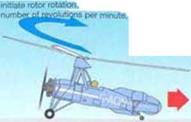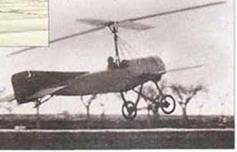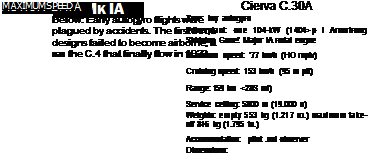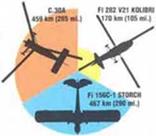Spanish rotarywing pioneer
|
С |
ктла patented the
autogyro (or miroglro) design tor lus aircraft. Their key feature – and a vital coninUltlun to helicopter development – was the articulated tutor huh Its drag and flapping hinges allows I tltc individual tutor blades to nsc and fall аікі thus ‘evened out’ the lift Tlie lirst workable craft
the С. i. flew in January 1923 and covered » kin l3 miles». By Sc-ptenilxT 1928, taena’s C.8L Mk II design. |x»vcred In’ a I l9 k\ <200 lip » Lynx engine and based on an Avio SO і fttschge. IlCide a lO-kin (2S – mile» flight aenris the English Channel and on to Hart».
Cierva died in an airliner crash at Croydon in ІЯчешІчч 19.16. by which time his ideas
Above: do Havilland’s distinctive lines were evident in the C.24, designed and built by the company in 1931.
lud been accepted and he had formed his own company in England lltc С. Ю had a newly ilevelopetl tilling rotor, allowing it to take off vertically
 To start the meet rotor spmng Mfcm taMr-of. Pw C tft and Шаг <*sgrw nhoducort а <*mi ігапатьюп *yscm imm vw men engnc. T»« лаг. controM by a rotor склф ana brake operator front rno cocxjut
To start the meet rotor spmng Mfcm taMr-of. Pw C tft and Шаг <*sgrw nhoducort а <*mi ігапатьюп *yscm imm vw men engnc. T»« лаг. controM by a rotor склф ana brake operator front rno cocxjut
A sawrvc. tnOc» Armetrong Sodotty Genet M*» іл їжіоі «вам tot kwit<0 tp. iwra mtatal »i theСЭ0А Tome RAF, the rrijne w<» knoen as the Oat I.
 Although tne mtutl Cwrva dosagrm used rsretng mroran hifiwaix». ttw C. 19 wxt subooauu* modes avto смгрове-txrtt Sixty s« wero icence-butfi by л v Btx* and Co. Ltd. at ut Manchester in France. LtorO et Омег bud 25 dowynuled LeO СЭ0′. w*ste Госко vMif їли! ao cui’ipiti
Although tne mtutl Cwrva dosagrm used rsretng mroran hifiwaix». ttw C. 19 wxt subooauu* modes avto смгрове-txrtt Sixty s« wero icence-butfi by л v Btx* and Co. Ltd. at ut Manchester in France. LtorO et Омег bud 25 dowynuled LeO СЭ0′. w*ste Госко vMif їли! ao cui’ipiti

![]()

Getting airborne in an autogyro
CIERVA S AUTOGYRO: The term ‘autogyro’ was coined by Juan а,, ід Cierva to describe his aircraft in which the S-eowtv* io main rotor provided lift tor vertical night.
FORWARO MOTION; With the Socfcod Uw engine was «»ied and polled the aircraft
•o>*ard On early designs the trtor won unlocked and m ^ow made the rotor rotate.
TILTING ROTOR: The C 30 used a drlveshaft horn the engine to Once the rotor had reached the required it was Med backwards
![]()


 |
Cierva Autogyros
 Kota Mx It (С 30A»> had a too xpeed oomporaUe to me n«od wrgfeMWSx»" AIMugh fW Rot» wem oflacncO to tn* School of Army Cocpeahcn trey *«• soon aswjnod a coastal radar catbraeon role The Storch was a «MukO Oerman StOt taaon arcraft
Kota Mx It (С 30A»> had a too xpeed oomporaUe to me n«od wrgfeMWSx»" AIMugh fW Rot» wem oflacncO to tn* School of Army Cocpeahcn trey *«• soon aswjnod a coastal radar catbraeon role The Storch was a «MukO Oerman StOt taaon arcraft
cm imsvbniaai. p ».) maAf
FI m V? t HC4IRRI ISO Mill (Ю «M l
![]() ITS tax* (10* «М )
ITS tax* (10* «М )


![]()
![]()

F<y yaw smutty. tn© С-ЭОЪ vertcal sutaces логе of а «.’«**> area A urge tax) In had а шиї trrimv ж in© extreme tear A vnrtl witrai tn was eho «too The hcnronW Ins hod upturned inch tor extra smutty
Among W« now huttures ot the С ЗОЛ vwra luklrv) rotor blndoe to allow смай htviganigc. nnd и reverse Mtoto* seclcn on tho port laipiane to counteract rotor tuque
LIFT FROM THE ROTOR: Combmed with the aircraft’s forward motion, tho spinrvng rotor cfcsc provided lift, much Uko a hciicopfor This aeowed the autogyro to make very short toko-offs
With an enpre of WOe "’ore poew И* П 20? w«ch-and-rmaa and хропшу haicopta* was at*» »o accompu*n vertical Ugh! usno two rtarmwiwd DMn The Storch ST01 атіЛ h»d a urge* onpre bul none Ы the. wxaldty Ot «he rotary wvprd types, iwyng on an arslrip Horn which Ю f Twain
cm
104 IW (140»* )
І;Ц. Ш
iCJOAxhod auoodrange раЛмтапса. comparable Ю mat of tha Starch Lack «I range wax
iitertoomngd capacity, whxnux meCervauMda largar іимире. mw to a bed
*«4 arorafl. weh more tarhaga
EH Industries











